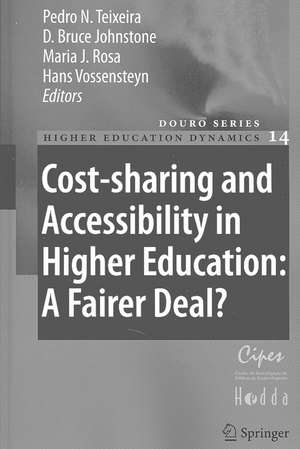Cost-sharing and Accessibility in Higher Education: A Fairer Deal?: Higher Education Dynamics, cartea 14
Editat de Pedro N. Teixeira, D. Bruce Johnstone, Maria J. Rosa, Hans Vossensteynen Limba Engleză Paperback – 19 noi 2007
| Toate formatele și edițiile | Preț | Express |
|---|---|---|
| Paperback (1) | 644.18 lei 6-8 săpt. | |
| SPRINGER NETHERLANDS – 19 noi 2007 | 644.18 lei 6-8 săpt. | |
| Hardback (1) | 651.84 lei 6-8 săpt. | |
| SPRINGER NETHERLANDS – 6 apr 2006 | 651.84 lei 6-8 săpt. |
Din seria Higher Education Dynamics
- 15%
 Preț: 648.24 lei
Preț: 648.24 lei - 15%
 Preț: 650.69 lei
Preț: 650.69 lei - 18%
 Preț: 957.62 lei
Preț: 957.62 lei - 18%
 Preț: 949.73 lei
Preț: 949.73 lei - 18%
 Preț: 897.65 lei
Preț: 897.65 lei - 15%
 Preț: 639.73 lei
Preț: 639.73 lei - 15%
 Preț: 648.56 lei
Preț: 648.56 lei - 15%
 Preț: 644.95 lei
Preț: 644.95 lei - 15%
 Preț: 641.85 lei
Preț: 641.85 lei - 15%
 Preț: 636.63 lei
Preț: 636.63 lei - 18%
 Preț: 945.92 lei
Preț: 945.92 lei - 15%
 Preț: 640.55 lei
Preț: 640.55 lei - 15%
 Preț: 646.30 lei
Preț: 646.30 lei - 15%
 Preț: 644.63 lei
Preț: 644.63 lei - 15%
 Preț: 644.82 lei
Preț: 644.82 lei - 18%
 Preț: 946.24 lei
Preț: 946.24 lei - 15%
 Preț: 645.79 lei
Preț: 645.79 lei - 15%
 Preț: 645.79 lei
Preț: 645.79 lei - 15%
 Preț: 642.18 lei
Preț: 642.18 lei - 15%
 Preț: 645.79 lei
Preț: 645.79 lei - 15%
 Preț: 639.73 lei
Preț: 639.73 lei - 18%
 Preț: 952.26 lei
Preț: 952.26 lei - 18%
 Preț: 945.79 lei
Preț: 945.79 lei - 15%
 Preț: 643.65 lei
Preț: 643.65 lei - 15%
 Preț: 641.20 lei
Preț: 641.20 lei - 15%
 Preț: 638.11 lei
Preț: 638.11 lei - 15%
 Preț: 643.16 lei
Preț: 643.16 lei
Preț: 644.18 lei
Preț vechi: 757.85 lei
-15% Nou
Puncte Express: 966
Preț estimativ în valută:
123.26€ • 129.04$ • 101.99£
123.26€ • 129.04$ • 101.99£
Carte tipărită la comandă
Livrare economică 05-19 aprilie
Preluare comenzi: 021 569.72.76
Specificații
ISBN-13: 9781402069154
ISBN-10: 1402069154
Pagini: 372
Ilustrații: XIV, 357 p.
Dimensiuni: 155 x 235 x 21 mm
Greutate: 0.52 kg
Ediția:2008
Editura: SPRINGER NETHERLANDS
Colecția Springer
Seria Higher Education Dynamics
Locul publicării:Dordrecht, Netherlands
ISBN-10: 1402069154
Pagini: 372
Ilustrații: XIV, 357 p.
Dimensiuni: 155 x 235 x 21 mm
Greutate: 0.52 kg
Ediția:2008
Editura: SPRINGER NETHERLANDS
Colecția Springer
Seria Higher Education Dynamics
Locul publicării:Dordrecht, Netherlands
Public țintă
ResearchCuprins
Strengthening Consumer Choice in Higher Education.- Cost-sharing and the Cost-effectiveness of Grants and Loan Subsidies to Higher Education.- Income Related Student Loans: Concepts, International Reforms and Administrative Challenges.- Access to Higher Education in Britain: The Impact of Tuition Fees and Financial Assistance.- The Changing Nature of Public Support for Higher Education in the United States.- The Canadian Experiment in Cost-sharing and its Effects on Access to Higher Education, 1990–2002.- Student and University Funding in Devolved Governments in the United Kingdom.- Student Financing in the Netherlands: A Behavioural Economic Perspective.- A Broader Church? Expansion, Access and Cost-sharing in Portuguese Higher Education.- The German Tuition Fee Debate: Goals, Models and Political Implications of Cost-sharing.- Accessibility and Equity in a State-funded System of Higher Education: The French Case.- Access to Higher Education Within a Welfare State System: Developments and Dilemmas.- Conclusion.
Textul de pe ultima copertă
Higher education finances lie at the crossroads in many Western countries. On the one hand, the surging demand of the past three or four decades, driven by a belief in higher education as a principal engine of social and economic advancement, has led to dramatic growth of the higher education systems in these countries. On the other hand, this growth in demand was accompanied by rapidly increasing per-student cost pressures at a time when governments seemed increasingly unable to keep pace with these cost pressures through public revenues. Hence, worldwide, the most common approach to the need for increasing revenue was to use some form or forms of cost sharing, or the shift of some of the higher educational per-student costs from governments and taxpayers to parents and students. This raises several important challenges to higher education systems. First, there is the political and social controversy associated with most forms of cost-sharing, particularly with tuition fees. Secondly, there are important issues in terms of the broad context of social policy, such as the role of families and students and the relationship that the state establishes with each of them. Third, there is the comparison of alternative instruments of cost-sharing and the direct and indirect effects of each of them, notably in terms of educational equality. Overall, underlying cost-sharing debates are fundamental questions about social choice, individual opportunities, and the role of government in society.
Caracteristici
Comprehensive discussion of the basic concepts of cost-sharing In-depth analysis of the major consequences of introducing some form of cost-sharing Timely international comparative approach based on several relevant Western national case-studies Articulated combination of theoretical issues and empirical analysis Rigorous but accessible approach bringing together research outcomes and policy analysis















